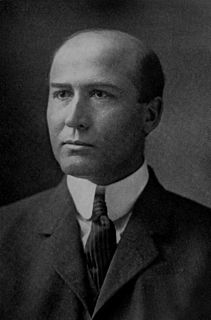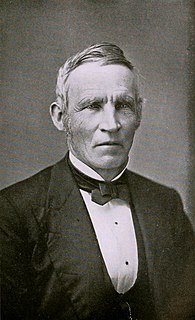A Quote by Ralph Waldo Emerson
The history of mankind interests us only as it exhibits a steady gain of truth and right, in the incessant conflict which it records between the material and the moral nature.
Related Quotes
The paleontological evidence before us today clearly demonstrates ordered progressive change with the successive development of new faunal and floral assemblages through the changing epochs of our earth's history. There should be no real conflict between science, which is the search for truth, and Christ's teachings, which I hold to be truth itself. It is only when scientists remove God from creation that the Christian is faced with an irreconcilable situation.
The conflict between the principle of liberty and the fact of slavery is coming gradually to an issue. Slavery has now the power, and falls into convulsions at the approach of freedom. That the fall of slavery is predetermined in the counsels of Omnipotence I cannot doubt; it is a part of the great moral improvement in the condition of man, attested by all the records of history. But the conflict will be terrible, and the progress of improvement perhaps retrograde before its final progress to consummation.
I would... establish the conviction that Chemistry, as an independent science, offers one of the most powerful means towards the attainment of a higher mental cultivation; that the study of Chemistry is profitable, not only inasmuch as it promotes the material interests of mankind, but also because it furnishes us with insight into those wonders of creation which immediately surround us, and with which our existence, life, and development, are most closely connected.
[T]aking the Third into account does not bring us into the position of pragmatic consideration, of comparing different Others; the task is rather to learn to distinguish between false conflicts and the true conflict. For example, today's conflict between Western liberalism and religious fundamentalism is a false one, since it is based on the exclusion of the third term which is its truth: the Leftist emancipatory position.
So let us decide whether you want a shelter, a safety zone, which will no longer yield conflict, whether you want to escape from the present conflict to enter a condition in which there shall be no conflict; or whether you are unaware, unconscious of this conflict in which you exist. If you are unconscious of the conflict, that is, the battle that is taking place between that self and the environment, if you are unconscious of that battle, then why do you seek further remedies? Remain unconscious.
We know only a single science, the science of history. History can be contemplated from two sides, it can be divided into the history of nature and the history of mankind. However, the two sides are not to be divided off; as long as men exist the history of nature and the history of men are mutually conditioned.









































